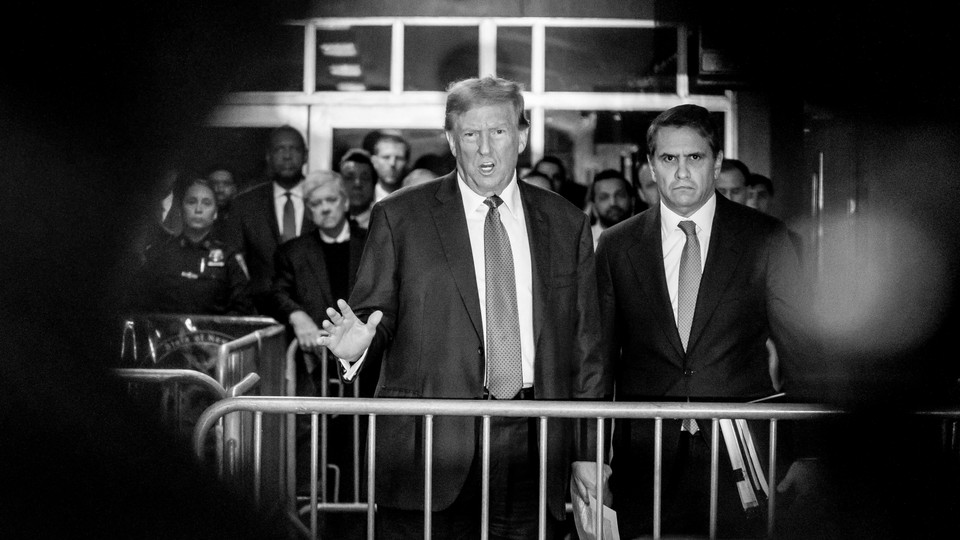The Jury, Not the Prosecutor, Decides Who’s Guilty
5 min read
Republican leaders are adamant and practically unanimous on one thing: The case that got Donald Trump convicted on 34 felony counts was a political prosecution.
“This was a purely political exercise, not a legal one,” said Speaker of the House Mike Johnson. “This entire trial has been a sham, and it is nothing more than political persecution,” charged Senator Ted Cruz. “This is a politically motivated sham trial,” said Governor Sarah Huckabee Sanders.
They have a point, but it’s not the condemnation they believe. Manhattan District Attorney Alvin Bragg is an elected prosecutor who ran as a Democrat in a heavily Democratic city. Trump also received more scrutiny from prosecutors after he became a political figure than he’d ever experienced before. But none of this has any bearing on whether Trump actually committed the crimes with which he was charged.
The bar for convicting any defendant in the American justice system is extremely high: It requires a unanimous decision by 12 citizens who deem a crime to have occurred beyond a reasonable doubt. A prosecutor may well have political motivation, but his motivation isn’t what determines a verdict; he must prove his charges in court, through an adversarial process. Despite the yelps that Trump was tried in a kangaroo court, his lawyers had every opportunity to challenge jurors, introduce evidence, question prosecution witnesses, and call their own.
After his lawyers had done that, jurors swiftly found Trump had falsified 34 business records. The questions that these Republicans ought to answer, as the journalist David S. Bernstein writes, are, Do you believe this should be legal? And if not, which of these acts do you believe Trump didn’t commit? Because what none of Trump’s would-be vindicators is willing to argue is that he didn’t try to hide a payment to Stormy Daniels to prevent her from talking about their sexual encounter. The more important question is not what motivated the charges, but whether they were justified and proved to a jury’s satisfaction.
Supporters of the Trump prosecution should be honest about the possibility of political motive underlying the case. The danger of political bias is an inherent flaw in the system of elected district attorneys that most jurisdictions around the U.S. use. (Federal prosecutors are a mix of political appointees and civil servants.) Bragg, while a candidate for the job, mostly avoided campaigning on going after Trump, though he did mention his involvement in prior investigations of Trump and his family, drawing criticism from his main rival. “It is a fact that I have sued Trump more than a hundred times,” Bragg said. “I can’t change that fact, nor would I. That was important work. That’s separate from anything that the D.A.’s office may be looking at now.” But Bragg was cautious and deliberate once elected, shutting down his office’s main effort to charge Trump (to the fury of its leaders) before adopting the course that eventually led to conviction.
Trump is also right to note that his business practices and records didn’t attract anywhere near as much attention before he was a politician. Trump was famous before he was president, but becoming the most famous person on Earth is something else entirely. With the perks of fame comes more scrutiny. (Just ask Hunter Biden.)
Closer attention to Trump, sooner, would have been good, because evidence suggests he was involved in a great deal of crime preceding his political career. For example, The New York Times has obtained decades of Trump’s tax filings, and experts who have examined them say they suggest prodigious tax fraud and evasion—but the years when that occurred are now outside the statute of limitations on that sort of crime. Similarly, New York Attorney General Letitia James found evidence that Trump had fraudulently changed property valuations since well before he ran for office. (James ultimately decided to file a civil suit and did not bring criminal charges; she won the case earlier this year.)
Commentators on the Trump hush-money case have often compared it to the prosecution of Al Capone on tax-evasion charges. Typically, that’s meant dismissively: Capone was a notorious gangster, involved in murder, bootlegging, and racketeering, so it seems ludicrous that he might get nailed on something as procedural and dry and quotidian as evading taxes. The dismissiveness also sometimes reflects an attitude that white-collar crimes like tax evasion are not as serious as others, as though theft is less important if it was done in a ledger book than a break-in.
But there’s another way to interpret the Capone case. The mobster committed many crimes, but he did them in a way that made them hard to prosecute. Like many organized-crime bosses, he made sure to speak about things elliptically and keep his fingerprints (literal and metaphorical) off things. (Does this sound familiar?) But Capone couldn’t hide financial crimes as effectively. Prosecutors went after him for tax evasion because that’s what they could prove. It is not selective prosecution to go charge someone for a crime for which you have evidence, even if you don’t charge the other, more difficult-to-prove crimes. It is realism. It’s also justified and just.
Republican cries of political prosecution can also be understood in another, better way. Since Trump’s defenders are unwilling to argue that he didn’t falsify the records or that it shouldn’t be a crime, they’re actually arguing that he should get a pass on crimes they view as minor because he’s a political figure. The American justice system has never held that someone should be immune from repercussions for their behavior simply because they’re politicians. Now Trump and his allies are making versions of this extremely swampy argument, both at the Supreme Court and in the court of public opinion.
“If they can do this to me, they can do this to anyone,” Trump said at a press conference this morning. Indeed, that’s the point of equal justice under the law.



